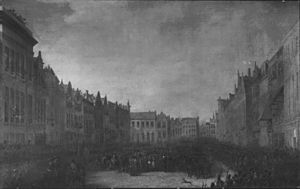Siege of Antwerp (1814) facts for kids
Quick facts for kids Siege of Antwerp (1814) |
|||||||
|---|---|---|---|---|---|---|---|
| Part of the War of the Sixth Coalition | |||||||
 'The Allies Taking Possession of Antwerp in 1814'. By Mathieu Ignace van Brée |
|||||||
|
|||||||
| Belligerents | |||||||
| Commanders and leaders | |||||||
| Strength | |||||||
| 10,000 | Jan–Feb: 8,000 Mar–May: 5,000 |
||||||
| Casualties and losses | |||||||
| unknown | unknown | ||||||
The Siege of Antwerp was a long battle that happened in 1814. It was part of the War of the Sixth Coalition. This war was fought between France, led by Napoleon, and a group of other European countries.
The siege of Antwerp lasted for many months. It began on January 14, 1814, and ended on May 4, 1814. Antwerp is a city that is now in Belgium. At that time, it was part of Napoleon's French Empire.
Contents
Why Did the Siege Happen?
Napoleon's Retreat
After a big fight called the German campaign of 1813, Napoleon's army had to go back across the Rhine River. This was a major defeat for him.
While two other armies of the Allies marched towards Paris, a third army moved into the Low Countries. This area includes modern-day Belgium and the Netherlands.
Antwerp's Defense
In January 1814, Napoleon put a man named Lazare Carnot in charge of Antwerp. Carnot was an old general who had been important during the French Revolution.
Antwerp had a strong defense. About 10,000 French soldiers were stationed there. They were ready to protect the city from the Allied forces.
The Siege Begins
French Retreat to Antwerp
Before the siege, there was a battle at Hoogstraten on January 11, 1814. The French lost this battle.
After the defeat, General Carnot and his soldiers went back to the fortified city of Antwerp. They also used the strong Antwerp Citadel for defense.
Allied Forces Attack
The Allied forces then surrounded Antwerp. This is what a "siege" means: an army tries to take a city by surrounding it and cutting it off.
At first, British soldiers led the attack. Later, Prussian forces took over the siege.
Antwerp Holds Strong
The French soldiers in Antwerp fought very hard. They were helped by a French navy group led by Missiessy.
They kept the Allied armies from taking the city for many months.
The End of the Siege
The siege finally ended because of big news from France. Napoleon gave up his power, which is called "abdication."
After Napoleon's abdication, a new king, Louis XVIII of France, took over. He signed an agreement to stop the fighting. Only then did the French soldiers in Antwerp surrender the city.
This meant the Allies had won the siege, even though they hadn't forced the French out by fighting.
 | Delilah Pierce |
 | Gordon Parks |
 | Augusta Savage |
 | Charles Ethan Porter |

